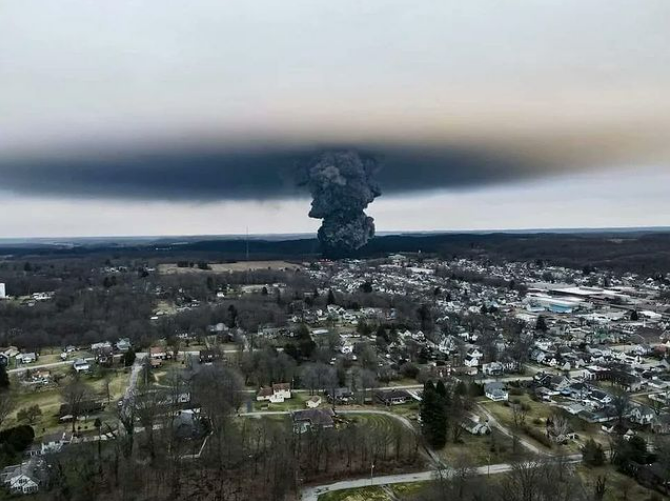Understand Your Rights. Solve Your Legal Problems


The rail giant says it shouldn't pay alone for the fallout in East Palestine. Two companies say, "Not our fault."
A year after a freight train carrying toxic chemicals derailed in East Palestine, Ohio, Norfolk Southern is back in court—but not to answer for the crash itself. This time, the company is looking to split the cost of the $600 million class-action settlement it agreed to pay out.
The railroad wants GATX, which owned one of the railcars involved, and OxyVinyls, the chemical manufacturer, to cover part of the bill. Both companies say they had nothing to do with the wreck—or the decision to burn off hazardous materials in its aftermath.
The trial begins this week. It won’t affect what residents receive. That part is done. What’s at stake now is who’s on the hook financially.
On February 3, 2023, a Norfolk Southern train derailed on the outskirts of East Palestine, not far from the Pennsylvania border. Several cars caught fire. Others spilled chemicals, including vinyl chloride—a compound used to make PVC plastic.
Three days later, emergency officials made a controversial call. Worried about the risk of explosion, they vented and burned five tank cars on purpose. A towering black plume spread over the town, sending hundreds of residents fleeing and raising long-term concerns about air and water safety.
The scene made national headlines. So did the questions that followed: Who made the call to burn? Was it necessary? And who’s responsible for the damage left behind?
Norfolk Southern has already spent more than $1 billion cleaning up the site and addressing legal claims. It’s now asking the court to recognize what it calls shared responsibility.
The railroad argues that:
GATX’s railcar was the one that failed. An overheated bearing on that car led to the derailment, according to investigators.
OxyVinyls provided chemical data that suggested vinyl chloride could explode under certain conditions—data the railroad says influenced the decision to burn the cars.
In a statement, the company said it has “paid the full cost alone despite clear evidence that others were involved.” The lawsuit, it added, is about making sure “everyone responsible pays their fair share.”
Both companies deny any role in the disaster and say Norfolk Southern is trying to pass the buck.
GATX maintains its railcar met all safety requirements and says the railroad was in charge of inspections and operations. Even if the car had prior damage from sitting in floodwaters during Hurricane Harvey in 2017, GATX argues, Norfolk Southern should have identified and addressed it years ago.
OxyVinyls is equally firm. The company says its tank cars didn’t rupture, and it had no say in the vent-and-burn decision. In fact, it claims its experts advised against it—warnings that were allegedly ignored.
“This trial is nothing more than Norfolk Southern’s continued attempt to shift blame,” the company said in a statement.
The National Transportation Safety Board (NTSB) investigated the crash and backed up several of Norfolk Southern’s and GATX’s claims—while also highlighting key failures by the railroad.
Here’s what they found:
The crash was triggered by a failed bearing on a GATX railcar.
Norfolk Southern’s heat sensors detected rising temperatures, but the alarm didn’t go off until it was too late to stop the train in time.
When it came to the vent-and-burn decision, the NTSB said it likely wasn’t necessary. The tank cars were cooling, and the information used to justify the move may have been outdated or misinterpreted.
For residents, the outcome of this trial won’t change how much they receive from the settlement. That’s already in motion—though most payouts have been delayed due to appeals.
But the case still matters. It could reshape how courts handle liability in future derailments, especially those involving dangerous cargo and third-party companies.
This isn’t just a battle between three companies. It’s a test of who gets held accountable when safety systems fail and lives are disrupted.
Railroads often don’t own the cars they haul. Chemicals are shipped across the country every day. If something goes wrong, how much blame falls on the operator—and how much on the companies that supply and load the cargo?
The court will weigh those questions over the next few weeks.


